#this is not even just with native finnish speakers
Text
One way people unintentionally tell on themselves a lot is by assuming that their own biases or thoughts are universal, and then accusing others of something they never said. When you assume the worst of someone you don't know, you're just publicly broadcasting the worst things you can think of.
You can pretty much always tell whether or not someone speaking finnish is a native speaker. The pronunciation is distinct and differs from all but a few related languages, finnic languages do not even resemble any other language family in Europe. Save for a few Estonians - whose language is so similar in phonetics that someone who speaks neither language could not tell them apart - every finnish-as-a-second-language speaker I have met has had an accent, no matter how faint. And the grammar rules are infinite and absurdly complex - someone who has lived here for 20 years and speaks finnish fluently will still make mistakes that a native speaker wouldn't, but more subtle and nuanced ones.
The sheer fucking amount of times I've had someone go "how dare you say that" when I aknowledge the finnish language is like this is astonishing. Who said that not mastering finnish flawlessly is a personal failure, or fault in one's character? I did not, nor did I imply so. The accuser did, seeing their own shadow on me and deciding to attack in self-righteous fury. Every time I hear someone speaking finnish and notice how they conjugate a verb the wrong way - often in a way that would be more logical than how native finns say it - I'm only aware that they probably memorised conjugations from a textbook, and that if I had not learned this language as a native, I could not do what they have done.
I've had people who have never seen finnish romani come at me for saying that they're easy to notice in a crowd by the way they look. They hear me say that and the first picture that pops into their heads is the assumption that I am claiming that the way they look or dress would be bad. No, you said that, without knowing better. Finnish romani are the downright cleanest and tidiest people I have met, putting a lot of effort into being well-dressed and presentable is literally a part of their culture. And as much as ethnic features are always morally neutral, I would still go as far as saying that they are remarkably beautiful people.
Politely pretending to not notice matters that are obvious is how polite people tactfully handle things that are bad or mortifyingly embarrassing. By insisting that it's rude to merely aknowledge how people who are different from me are different from me, you're just airing out what you are thinking. And people like this get offended when I tell them their assumptions were wrong, and will go "how was I supposed to know?" And the thing is, you weren't supposed to know.
You just supposed that you knew.
411 notes
·
View notes
Text
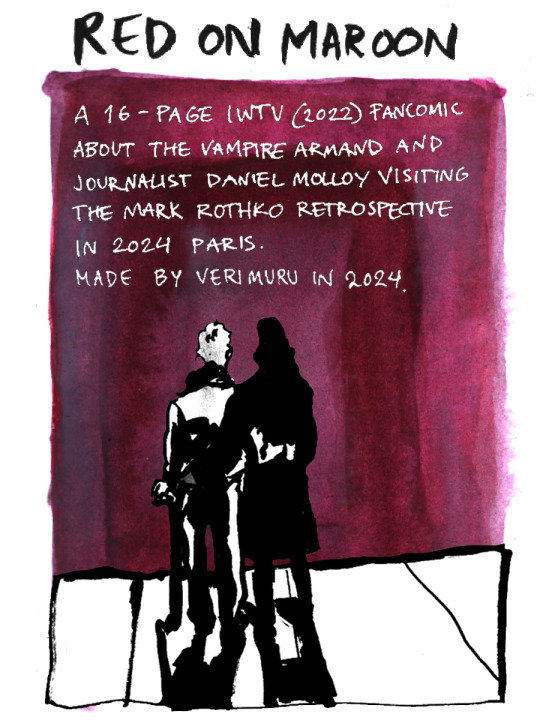
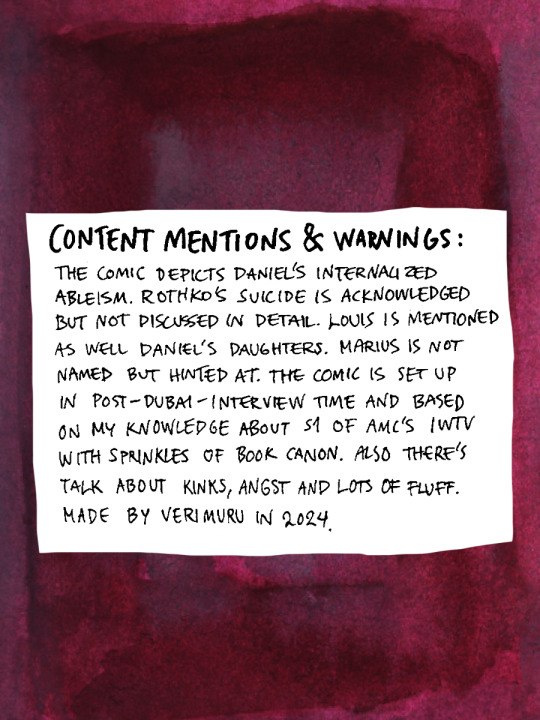
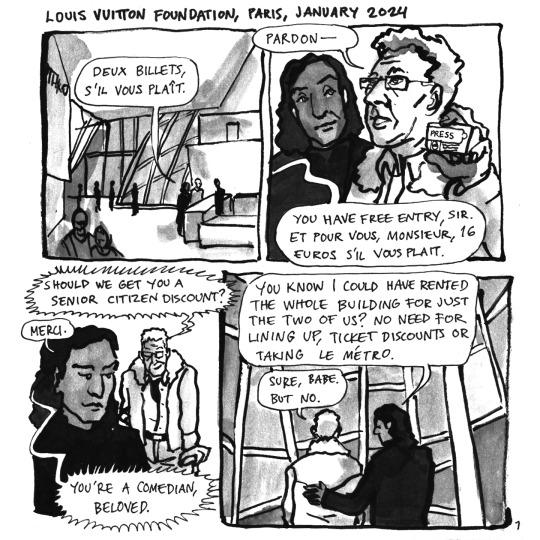
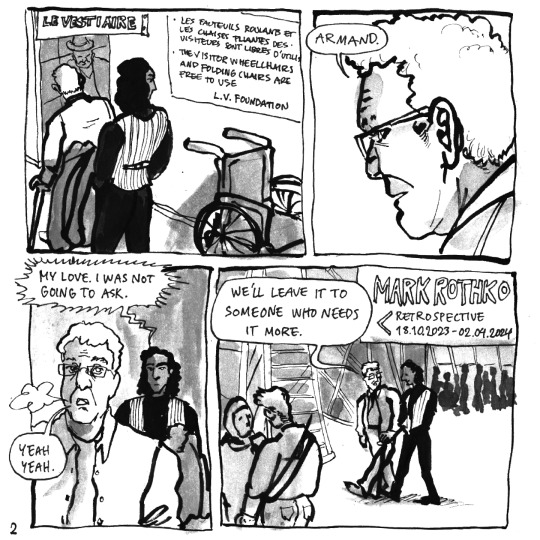
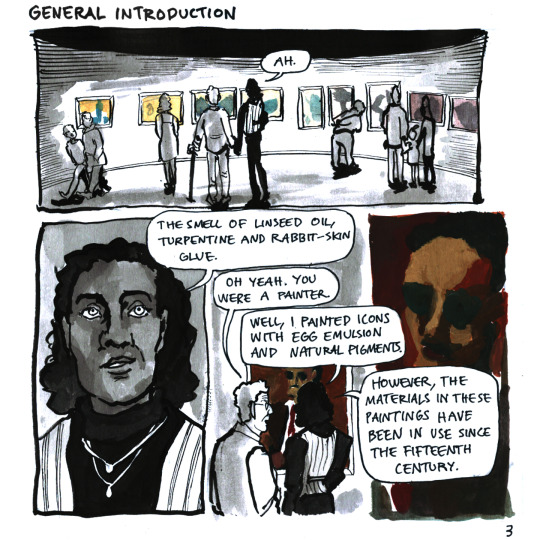
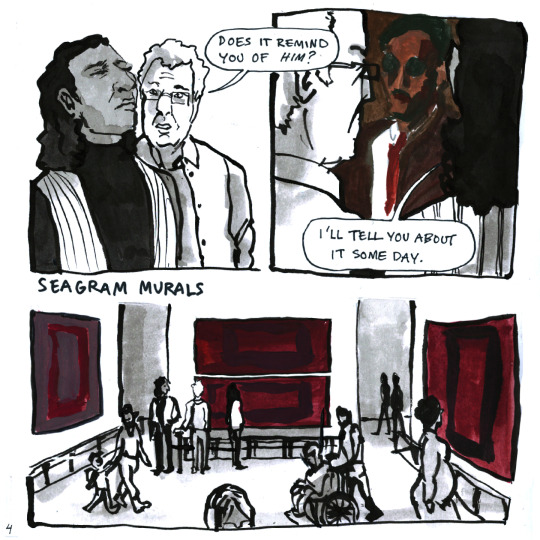
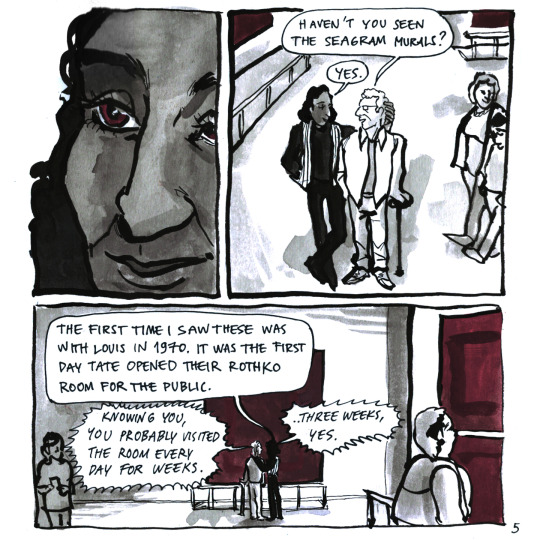
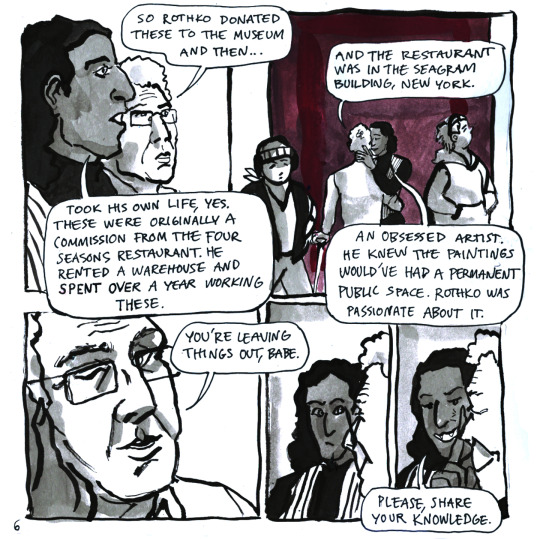
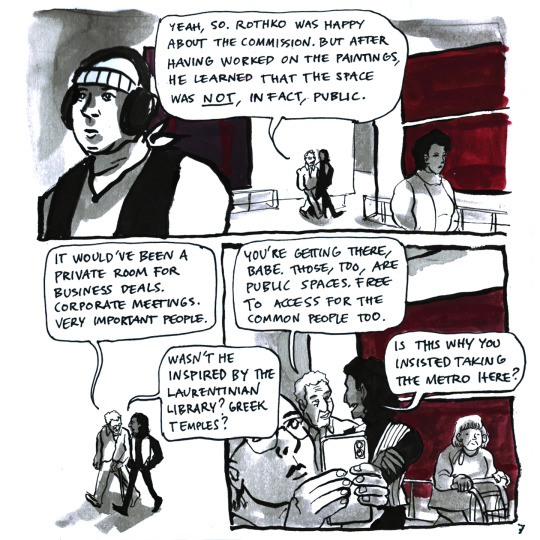
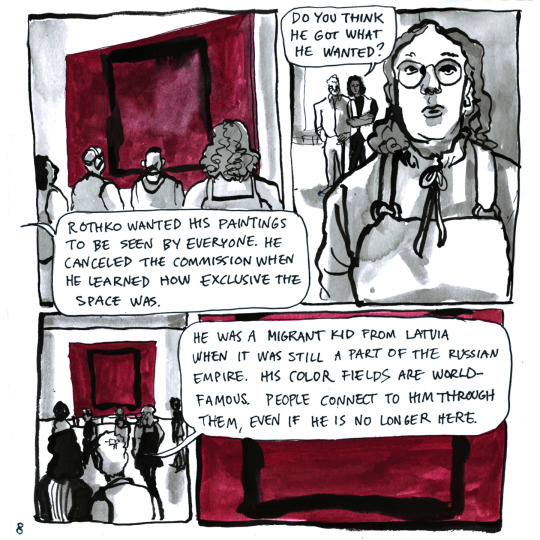
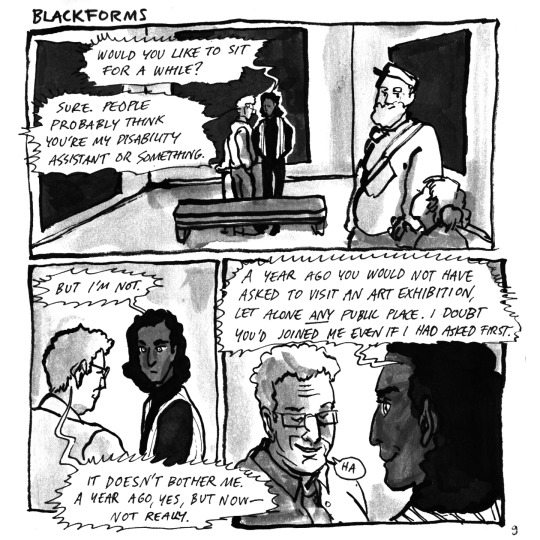
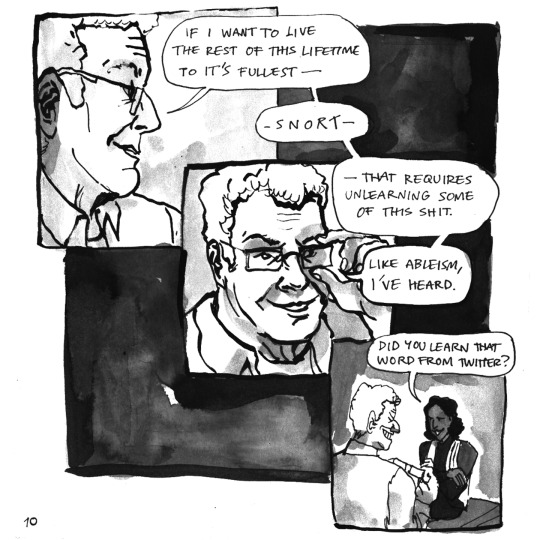
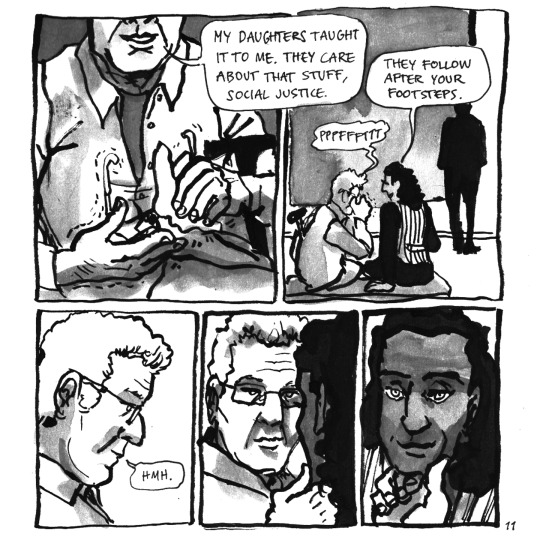
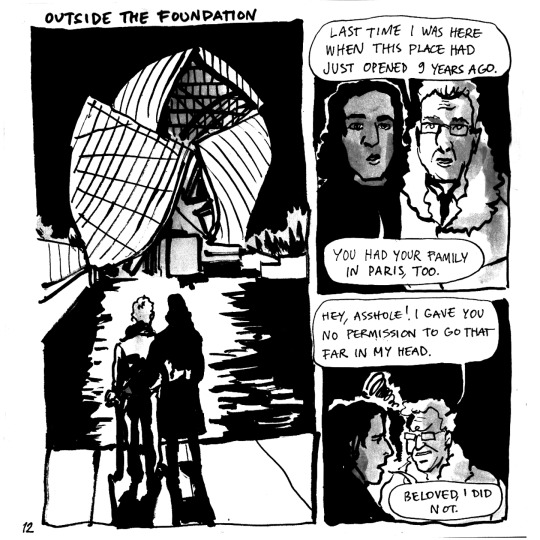
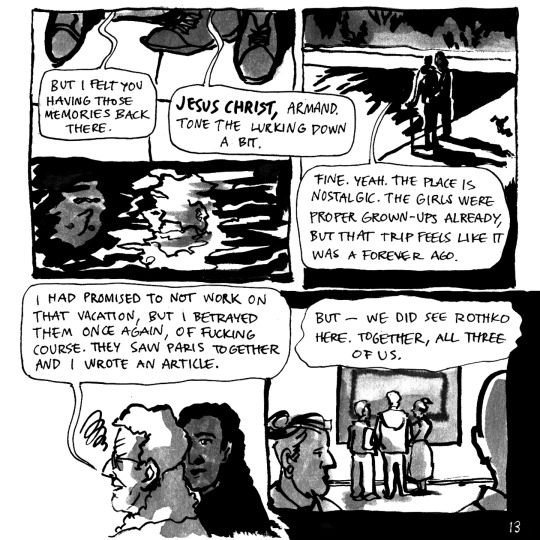
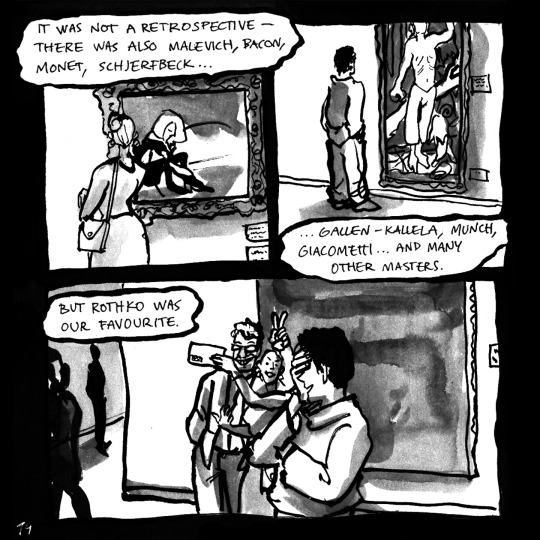
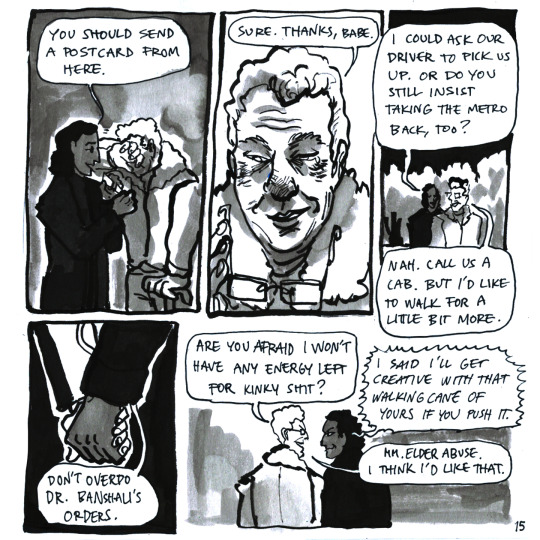
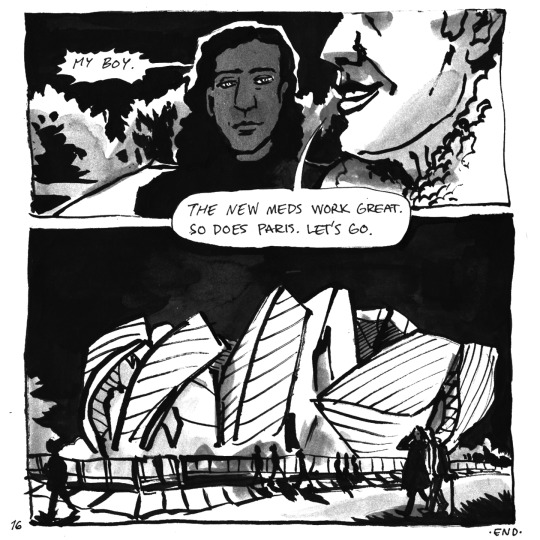
Red on Maroon
A 16-page IWTV (2022) fancomic about the vampire Armand and journalist Daniel Molloy visiting the Mark Rothko retrospective in 2024 Paris.
Content mentions & warnings:
The comic depicts Daniel’s internalized ableism. Rothko’s suicide is acknowledged but not discussed in detail. There’s angst, talk about kink and lots of fluff.
Louis is mentioned as well as Daniel’s daughters. Marius is not named but is hinted at. The comic is set up in post-Dubai-interview time and based on my knowledge about s1 of AMC’s IWTV with sprinkles of book canon.
Some notes about the comic below:
As with my last comic, I am not a native English speaker, so I hope you keep that in mind when reading <3 trying my best here meow meow
The Rothko retrospective can be visited until 2nd of April of 2024 in Louis Vuitton Foundation. I visited the place in January, so the comic’s surroundings are a mix of memories and some image searches, but in no way fully accurate. Since visiting Paris next week is probably not an option for most people, the foundation has a very cool free app, where you can listen to an audio guide about Rothko and paintings in the exhibition. I mostly used their app as a source for this comic, so in case you want to learn more, go here: https://www.fondationlouisvuitton.fr/en/events/mark-rothko
I listened to a lot of Morton Feldman’s Rothko Chapel -album while making this. So put it in playing in the background if you’re into that sort of thing. Link to the playlist on youtube
Since I am Finnish and I found out that one of LVF’s first exhibition had some Finnish painter’s work, ofc I had to include them… Page 14 has Schjerfbeck’s “Dancing Shoes” and Gallen-Kallela’s “Kullervo Cursing”.
Ok finally some headcanon stuff: in my head, while writing this comic, I imagined Daniel having accepted the dark gift from Armand, but both of them wanting him to live as a human as long as possible to enjoy the benefits of a… mortal body. :’D Since, you know, vampirism is forever anyway, so why not enjoy the variety of bodily fluids, body heat, aches and weirdness of aging? While having a chronic illness is shitty, his life is not, and while his disability marginalizes him, there’s a perspective there, a person living and enjoying things, allowed to take space and feel his thoughts develop from these changes (that also affect over 6 million people around the world with Parkinson’s).
After finishing the comic I am not so sure if Daniel is going to be turned into a vampire after all. So your guesses are as good as mine, would love to hear your suggestions, hehe!
I wish we knew more about Daniel’s daughters! I just came up with something here because I wanted to draw them and wanted to see their dynamics as a family.
I have now read the Devil’s Minion part from Queen of the Damned as a separate short story and appreciate the TV show’s changes to Daniel even more. I can’t wait for S2…..
My sincerest thanks to @anaid-queen for being a test audience, my informant and such a cheerleader the past week <3<3<3
Hope you enjoy xoxo
SORRY I POSTED THE WRONG IMAGE FILES FIRST WAHHH I had to repost ;_;
#armandaniel#verimuru art#iwtv#amc iwtv#iwtv fanart#daniel molloy#armand the vampire#the vampire armand#tvc#old man daniel#daniel x armand#iwtv 2022#iwtv fancomic#the devils minion#armand#interview with the vampire
167 notes
·
View notes
Text
finnish language is terfy
gender ideology is very fragile theory. "gender" is an english word which has no translation in finnish. we only have words for "biological sex" and "biological sex role", (direct translation meaning "gender role"). the direct translation for "gender identity" is "biological sex identity". that's it. it's incredibly nonsensical and I bet no one actually understands what it means.
we have just accepted this new idea from the US like we always do even when our native language doesn't have words to actually support this theory. when I was learning german my teacher used the word "gender" in a linguistic context (feminine/masculine words). that's the only context I truly understand it.
georg orwell said that by controlling words you can control thoughts but I think he was wrong - you don't even need words to control thoughts. finnish genderists are proudly talking about "biological sex identity" and how they are "correcting their sex" (transitioning). but you can't change your sex, so what on earth are you talking about? the fun thing is that we don't even have different pronouns for men or women - everything here is already so perfectly neutral and genderless that their war is pointless. these people are trying to build something what can't be built with the words that are available and they are fighting against something that does not even exist.
so if english speakers ever think that gender ideology is stupid in english, it truly reaches the depths of stupidity when we use genderless languages to discuss it. I love how specific and straightforward the finnish language is! even the word for biological sex ("sukupuoli") implies there is only 2.
#adult human female#radical feminists do interact#radical feminism#i stand with jk rowling#terf#radblr#terfblr#terfsafe#feminism#gender critical#lgb drop the t#lgb alliance#gender ideology#gender abolition#tra
139 notes
·
View notes
Note
Can you please tell us more about the informal/formal you usage in estonian? I'm not a native speaker and ive been taught to use the formal form with people i don't know, but....i was also not taught by a native speaker, so lately i've been wondering if that is Actually A Thing in estonian or not, since most people i meet nowadays use the informal form right away
It is a thing in Estonian, just less than it was even 10-20 years ago. If your first language is Finnish, Estonians definitely use it more than Finns (for now).
Formal with people you don't know is a solid rule, because if a person is chill, they usually offer to use sina the first time teie is used, and if they're a bit more formal no social mishap was made.
Usually same-age(+/- 5years your age usually) friends, co-workers and people younger than you are sina, but people older or in respected positions are teie (so teachers, professors, any person in the role where they are representing the state and so on).
49 notes
·
View notes
Text
This has probably been said and opined on multiple times but on how to translate Käärijä. Inspired by Kääryle and Kärtsäri in the previous reblog.
Käärijä: someone who rolls. The canon implication seems to be money since he’s chronically broke, but could also be read as rolling practically anything, from a cigarette to a cabbage roll. But the real distinction here is, rolling something inside another thing. So while rolling pin rolls, it does not make rolls. Käärijä is the one who rolls the rolls. The one who rolls.
Kääryle: the actual cabbage roll. Or spring roll. Or vine leaf roll. Or person rolled inside a blanket. Kääryle.
Kärtsäri: Slang or dialect version of Käärijä. It’s hard to say which in Finland to be honest, since no one speaks the book version of this language and no one can keep track of all the dialects vs people in Helsinki just not caring about the language, at all. But it’s easier to say than Käärijä, even for Finnish people (it may be hard to believe but this language can be a right bitch to even native speakers) and I think that matters the most. The fact that it also kinda sounds like someone who smokes/scorches is secondary and irrelevant.
82 notes
·
View notes
Text
English speakers aren't the only ones who do funky stuff with their language that they don't notice but second language speakers do notice (I'm referring to the gemination of stop consonants between morphemes in words like "bookkeeper," which occurs in actual speech among many native speakers of English even though on a phonemic level they analyze them as two separate consonants)
For an example, did all of my fellow Finnish-speakers know that the phoneme /n/ (like the final sound in the word pojan) sometimes get realized as the sound [m]? Consider the phrase pojan pallo. Notice how the final /n/ gets realized as [m] unless you're articulating very carefully? Why does this happen? Well it's simply because [m] and [p] are both bilabial sounds. You're already anticipating the [p] sound at the beginning of pallo so to make things easier for you instead of producing the alveolar nasal [n] you take a shortcut through [m] (which is also a nasal, albeit a bilabial nasal!)
And that's the funniest thing: first-language speakers are usually the last to notice these types of oddities. Just like many English speakers would say that "bookkeeper" has two separate consonants at the morpheme boundary and then actually produce a single, geminated consonant, most Finnish speakers would think there was something wrong with your hearing if you suggested that the word pojan in the phrase pojan pallo ends in anything but /n/
33 notes
·
View notes
Text
A little thing I made about inflecting municipality names
Most names in this list were checked from the official web pages of the municipalities. Blame them for any mistakes (/j)

A lot of teachers will tell you to remember some kind of rule set for these kinds of things but I wouldn't do that. Instead, I would advise you to think of them as guidelines; for example, many places that end in -joki use the allative. The most important thing to remember though is that it is not set in stone! There might be a place that uses the illative instead.
Also, remember that even native speakers get these things wrong sometimes. (I had to google an embarrassingly large amount of these just to be sure which one it was) When in doubt, think of a similar place name and use the ending. (you might or might not be correct!)
There might also be situations where the locals cannot come to a conclusion on what the "real" way is, I added some examples of that too. I've also come across situations where two different places have the exact same name but they both inflect it differently...
Here are some resources on this.
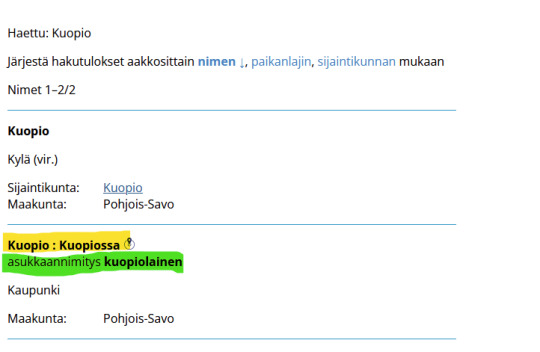
(In Finnish) It's very useful since it gives both the inflection (yellow) and what the locals are called (green)
The Institute for the Languages of Finland advice page on the matter. (there's more links to stuff in there too) (In Finnish)
13 notes
·
View notes
Note
hey, i wanted to ask,
as a finn, how different is the pronunciation of a and ä in practice?
if i used roughly the same sound for them when speaking, would a) people understand me b) look at me weird?
i'm asking because i just can't tell the difference between them when i hear them in words.
or even if i can a little bit, the description i always get by polish teachers is that a is our "regular", "easy-for-us" a and 'ä' is "something between a and e", which just sounds wrong to me, SO NOT like what i hear in all the words said by native speakers. if anything a is more like how i pronounce our a in polish (we have only 5 vowels, aeiou). (btw, do you remember that video where jere asks joker out to pronounce käärijä and he complimented their pronunciation, how much of it was him being nice? did they pronounce it 100%? lol)
all the polish info prob isn't very useful, just kind of providing additional context
Im sorry that its been like 2 weeks since this ask ohmyGOD but I'm here now 😮💨
The most basic way I can explain the difference is that -a is just your regular, when the doctor asks you to stick out your tongue -a sound. -ä on the other hand is the sound you'd make if you say words like "can", "man", or "brand" with an american accent. You kind of push it down into your throat, whereas -a kind of opens it up. We finns do understand if you don't use the correct sounds, we have a lot of immigrants especially in bigger cities who never learn the difference and no one really bats an eye when they hear it :)
And I think I do remember that video and I'd say it was pretty spot on! All the boys pronounce finnish very well, and I think I remember their "käärijä" also being v v good 🫶🏻
33 notes
·
View notes
Text
I've heard many non native english speakers complain about the lack of variety in our words. And for a while I believed that, but in helping my Finnish friend find the closest translation for the word "uhkarohkeus" (we landed on foolhardy) I've come to realize how wrong that is.
With a word as simple as foolhardy, there are dozens of singular words with similar but slightly different meanings to describe a myriad of different scenarios. And dozens of other similar words to those similar words to foolhardy. And so on and so forth. When you tack on full sentences and sayings? You've got hundreds of thousands of ways to express a singular concept.
Sometimes exact equivalents to words don't exist in other languages. But that doesn't make the other language less diverse!
And yes this goes for swearing in english too 🔫 we have more swears then you'd think, and plenty more words aren't specifically classified under the term "swear" but have the same effect. And yes we have a million ways to use these words as well
I often see disappointment over how flat the translations of scenes like "Cellbit waving around a chainsaw while screaming" are. And it's always "english doesn't have more words then fuck" and not "whoever the translator is doesn't have the knowledge or the time to use the heavy variety of swears and insults the english language has." I mean even with just "fuck" there is a whole feast of different words and insults utilizing it
(this isn't flack to non native english speakers btw, I don't expect the average person learning our language to know this. I'm just kicking myself for believing it. My language has plenty of expression and meaning in it too!)
#murky mumbles#flashbacks to my friend thinking the english language had like 4 swears#and then we just started listing dozens of swears at eachother#qsmp
21 notes
·
View notes
Text
rating the ✨ eesti keele käänded ✨
(disclaimer: i’m a native finnish speaker. do what you will with this information.)
Nimetav
The tap water and skimmed milk of noun cases. 1,5/10 because even though it’s boring and bland it’s also the easiest one (and yeah also pretty important but i’m here for the vibes only)
Omastav
this is just some guy to me. I have no opinions. Valid and simple. ??/10 because I'm so neutral about this one I don't even know how to rate this.
Osastav
This is also just some guy. ??/10 for this one too because this and omastav are like those kind of cousins that used to hang out during childhood summers and got mistaken for siblings a lot.
Sisseütlev
Fine?? I guess? A bit intimidating for some reason but not a bad one. 7/10
Seesütlev
Oh this one’s nice I’ll give it 9/10 because it’s so easy.
Seestütlev
Also easy and nice. 8/10 tho because the word itself looks too similar to the previous one and even though I do understand the reason it’s also annoying. Especially when your head hurts and your eyes are dry.
Alaleütlev, alalütlev and alaltütlev
Easy and simple but the words look so similar I have to say 6/10. Could be 7/10 but there are three of them so the similarity is even more annoying.
Saav
At this point I’m starting to realize how most of these are just so simple and easy thanks to the advantages of being Finnish. Anyway 9/10 because even though this one’s very valid there’s nothing exciting about this one.
Rajav
The worst, feels like sitting in a dark and cold sauna with clothes on. The whole concept of terminative case is just so fucked up and evil to me and meanwhile most of these noun cases are not exciting at all this one feels just malicious. -4/10 but I hope I will get along with this at some point.
Olev
I’d say 8/10 because this is another very familiar one but also 10/10 because this feels so nice and safe after the horrors of rajav.
Ilmaütlev
I don’t know why but I’m a fan of this. I like the vibe. I’ll be honest and say 10/10. Especially because there’s the -ta ending and I’m secretly a fan of geminations or whatever they’re called.
Kaasaütlev
10000/10. I love this, I’m the biggest fan of this one, we are besties and I am gently kissing the forehead of this one. I have nothing bad to say about this. The -ga is so nice to pronounce and it makes me go :) <3 every time. I actually like kaasaütlev so much I kinda wanted to start from this one but I was strong and saved this for last as a lil treat for myself.
#hi hello quess how i've been spending my wednesday afternoons#anyway another disclaimer it's midnight so if this makes no sense thats why#sadi.txt#might just tag this as#estonian#even though it's kinda scary for some reason#anyway now ill take my meds and eat something and go to sleep#and yes theres a typo in the first tag its over 12am as you can see
101 notes
·
View notes
Text
random vent under the cut about using english as a non-native speaker
a lot of the time i feel very self-conscious whenever i speak or write in english. even though i'm not *bad* at english i can still feel the language barrier holding me back at times. the way i talk and write can be very stiff and it really sticks out, at least to me, and it sometimes makes me feel very stupid.
i can feel the lack of vocabulary and skills hindering my ability to show how i truly feel or think in certain situations and it's frustrating as hell. i know i'm not an idiot. i know that in finnish i'm (usually) a pretty smart person, but in english i sometimes feel like a fucking toddler trying to get a simple point across. the way i talk can also be very awkward because i have to pause *a lot* to find the right words, and i can just *feel* my brain buffering like a fucking youtube video trying to keep up with what i'm trying to say. having to translate everything in your head on the spot can get very exhausting. add chronic anxiety and somewhat lacking social skills into the mix and oh god oh fuck i feel like i can't communicate with people at all sometimes
i use english every single day, most days even more than finnish, whether it's being online scrolling through tumblr or reading articles etc, playing video games, watching shows and movies, chatting with my american boyfriend or my online friends from all around the world. even the UI on my phone/game consoles/etc is in english. i constantly try to improve in hopes of being able to say that i've become "fluent" in english or whatever but idk, i feel like i've hit my skill cap a long time ago and i just can't get any better and it frustrates me so much. i just want to be able to convey my feelings and thoughts as clearly as possible but so much of it seems to quite literally get lost in translation. i hate feeling incompetent and stupid aaaaaaaaaaaaa
i don't think i have the energy to even start talking about how the way i speak english as a non-native speaker can be really weird to a native speaker because of the way i was taught british english but i've also learned american english through media etc and how bc of that i've picked up words and phrases from all over the place so my english is just a weird amalgamation of british mixed with american english from all over the country
i had a point in all this but i forgot abt it a long time ago so this turned into a random vent post lol, thanks for coming to my ted talk i guess
6 notes
·
View notes
Text
Pasta vs. noodles
One of the most interesting (and difficult) aspects of language is categories and categorizing. It’s one of those things that are harder to spot as an outsider and that guide the thought process of native speakers without noticing.
There are multiple examples of this. One of the most common would probably be colours. It’s also the most obvious one. Here is an entertaining video about how some languages categorize colours: https://youtu.be/gMqZR3pqMjg
However today I want to talk about something I truly care about as a Finnish speaker.

This is spaghetti. It is a type of pasta. It is not noodles.

This is ramen. It is a type of noodles. It is not pasta.
In Finnish there is a quite clear invisible line between pasta and noodles. You can basically show a Finnish speaker a picture like this

and they will most probably be able to tell that this is noodles, not pasta. Or that this

is pasta, not noodles.
Basically the idea behind the categorization is that you can divide flour based carbs into pasta, that comes from Italy, and noodles, that come from East Asia and South East Asia. The categorization is very itegrated in Finnish and really affects the way we think about food. I, for example, can’t even think about using oriental style noodles on the side of a tomato based sauce, because they “don’t go together”. Pasta is the choice for tomato sauces, with noodles you have to use a soy sauce based seasoning, coconut milk sauce or something similar.
I also actually think pasta and noodles are distinctly different although their ingredients tend to look the same on the surface level. It must be in the process of making them because they just... taste different. Even without seasoning...
Because the division is so clear and integrated in the Finnish language and my Finnish mind, I find it unreasonably irritating that people outside of Finland use the word “noodles” for spaghetti. But as I just have to live with my Finnish uncomfort, this is an amazing example of a categorization that is fundamentally different in Finnish, clear for native Finnish speakers, but you definetly won’t learn it in a language course. And it makes you think how much language affects your view on the world. And how much there is to languages that is hard to see and recognize.
Then on the other hand...
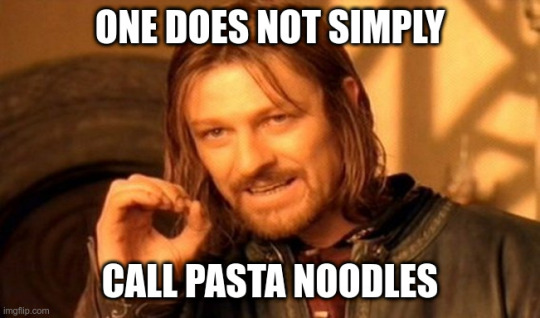
#finnish#languages#language#finland#language study#language learning#studying#learning#learning Finnish#studying Finnish#linguistics#pasta#noodles#food#culture
262 notes
·
View notes
Text
There are missing conjugations in Finnish, and it actually limits (slightly) the things you can say in the vernacular speech. For an example, saying: "We got sunburned." or "We are melting!" are both "impossible". Details ->
First, in the Finnish vernacular, the passive form is used instead of the first plural form. So me syödään instead of me syömme. The first plural carries a strange emphasis and is practically never used in everyday speech.
Secondly, there are a bunch of verbs for which the passive form is not used – e.g. palaa (to burn), sulaa (to melt), and sataa (to rain) – on the basis that they don't typically have a human subject or that they describe a transformation, which obviously requires a subject that transforms.
And it keeps going! Third, as a native speaker, most of the time, you can just conjugate verbs without thinking: The correct conjugations feel good and obvious. But for some of the verbs that are not typically used in passive form, the passive conjugations feel strange and icky: they break some underlying phonotactic rules most speakers are not even aware of. At least to me, the passive conjugations me palettiin or me suletaan sound egriegously wrong.
And this is a really specific and strange feeling: Following my intuitive conjugation creates words that are obviously wrong. I did everything "right" but came up with a wrong answer. It really strikes you dumb.
From the point of view of the standard language there is no issue, as you will never use them in passive -> the forms are just not supported. So the options are:
Weirdly formal standard conjugation (me paloimme)
Icky-feeling vernacular conjugation (me palettiin)
Circumvent the expression somehow (Aurinko poltti meidät, me kärähdettiin etc.)
Just avoid speaking to others
#this really bothers me#maybe in 100 years or so the problem will solve itself#finnish language#linguistics#finnish#language#cursed
5 notes
·
View notes
Note
So I was thinking why is Seiji’s aoa text in French while Mont isn’t. I think I know why for some reason these all out attacks can’t have text from the persona users native language(s).
But what about Ann ?
While she’s fluent she’s only a quarter American maybe English isn’t her native language makes it likely that one or more of her grandparents is/are American. (Just checked Rin’s aoa and have to amend this this also includes dialect unless Rin is from Taiwan which is either the devs/writers being bold and rebellious or China is saying Taiwan Chinese isn’t really Chinese.) but Japanese and presumably Finnish.
That’s why so far at least we haven’t had any text in any of the three Japanese alphabets. Everyone has ,with the possible exception of Rin ,Japanese as their native language.
Honestly, I always assumed that it was more of an aesthetic choice- that is, that English is the default for AOAs, but two of the rich kids' AOA finishers are in French because French is fancy and suits their vibe, whereas Rin's now is in Chinese because she's a transfer student and her rebellion seems to also be tying her to Chinese culture (given aspects of her outfit, and her Persona II). Not to mention that Kii's is also very obviously in Latin to support his exorcist vibe, hehe.
The idea that it has to be a language they aren't a native speaker of is an interesting alternative, though. Ann canonically is bilingual, but since you bring it up, we don't actually know where she grew up for sure, just that it was abroad and at one point she was in Finland. So it could actually stand to reason that Japanese or Finnish was her first language, and she learned English later on (though in that case, would it make more sense for her to be trilingual...? This one's not a comment on your theory, but more of an aside. Is Ann actually trilingual?).
As far as Rin, I think you're overlooking the more obvious solution that just because Rin grew up in, and is from, China, doesn't necessarily mean it was her native language either, hah. It might not even need the dialect disclaimer?
9 notes
·
View notes
Note
I was wondering, what languages *do* you speak? (and for academic curiosity's sake - do you have any advice on holding more than two languages in your head at the same time without mixing them up?)
*cracks knucles* OK SO i speak swedish (native language 1), vietnamese (native language 2), finnish (born and raised in finland), english (went to international school), and french (studied for 10+ years)
Also sidestory i lowkey count german too because i understand german through english/swedish osmosis + living in germany for half a year as a kid + studying it in high school for a year despite it literally overlapping classes with my french classes but they were like damn this kid already known one million languages just let her do whatever 👍 so i went to the german lessons instead of french but still turned in the french homework etc for an entire year. also they mistook me for a native speaker in austria once. but i still don't speak german tho not really
For me since most of my languages i learned early in childhood, they're pretty much ingrained and separated enough to not mix up in every life.
I did sometimes mix up the languages in my head when i was simultaneously learning french and german (+ italian over that summer. and briefly russian also. i'm so normal i promise) and i basically just had to spend more time on one than the other so that they would be less even. Something like studying the main language every day and the side one only on weekends etc.
That's the only advice i can think of tbh. I think being exposed to so many languages since a young age my brain is just naturally able to juggle a bunch of them without too much confusion lol
#sorry i can't give language learning advice like a normal person dhsjfhsjdjs#for reference. i am currently staying in the netherlands for the summer. and i just Understand things.#before i even came here i was looking at housing adverts and i didn’t even realise when i was reading one in dutch instead of english#i have not taken a single lesson of dutch in my entire life#what else is there. oh yeah i understand spoken + written norwegian too. it comes free with the swedish subscription#russian also. took sporadic lessons of it in high school and last week i downloaded duolingo and the placement test made me skip 12 units#but now i'm learning it for real this time#sorry i don't mean to flex fhsjdjks languages are like. idk. my brain just absorbs them#let's not go into the amount of japanese and korean and chinese i understand just from watching dramas
7 notes
·
View notes
Note
Is it just my experience or do people sound completly different depending on if they speak their native language or english? (assuming they arent a native english speaker)
because i swear, me speaking german compared to me speaking english - sounds like two completly different people
I don't think it's just you! I've played around with this with my native language, Finnish.
Now okay English isn't exactly a tonal language. It doesn't even have pitch accent like Swedish and Japanese. But when I speak English I feel like my tone is going all over the place (to my ears: I know for a fact that to a native speaker my English probably sounds comparatively monotone). Also, there's a noticeable drop in pitch when I speak Finnish.
But the more I think about it the more I realize that it might not even be a language thing: it might be a cultural thing. When I'm speaking Finnish I'm usually in a Finnish cultural context which carries with it its own social norms (not a lot of smalltalk, people generally give each other more space in conversation, there's very strict turn-taking) but when speaking English we might sort of almost subconsciously adopt some of the cultural affectations that come with that language? So like, in my case, even though English doesn't need to be spoken with a lot of tonal shifts and so on, it just feels natural cause that's what they do in all the things where they speak English?
I don't know if that makes sense, but I do agree that there is more to it than just "i'm speaking a different language now." Is this that code-switching thing they tried to teach me about at the university? Idk
10 notes
·
View notes